ChatGPT may be smart enough to pass law and business exams in the US. But the same can’t be said when it comes to exams in Singapore.
Last month, Straits Times tested the chatbot with PSLE questions. And it failed the English, Maths and Science papers.
It seems like that’s not the only exam in Singapore that OpenAI’s ChatGPT can’t pass. As a property portal, we at 99.co can’t help but wonder if ChatGPT can pass the Real Estate Salesperson (RES) exam.
Those who wish to enter the real estate industry must meet certain criteria, including passing the RES exam. The passing mark is 60%.
(Psst…for new RES agents, you can get our agent account free for three months! Find out more here.)
While we don’t have ten-year series for RES exams, we found sample RES exam questions on CEA’s website.
So we used these 10 questions to quiz ChatGPT, giving them context beforehand that these are RES exam questions in Singapore. While it’s not a comprehensive test, it gave us an idea of the chatbot’s capability to answer exam questions and explain property-related matters in Singapore.
The questions are all multiple-choice questions (MCQ), just like in the actual RES exams (2023 onwards). Out of these 10 questions, ChatGPT only managed to get three right. So it failed the test.

What ChatGPT got wrong
After each question, the chatbot replied with its answer and explanation. Based on the explanations given, it seems like it got them wrong due to wrong information.
Used the old TDSR
This is demonstrated by ChatGPT’s answer to a question on loan requirements, explaining that the Total Debt Servicing Ratio (TDSR) is 60%.
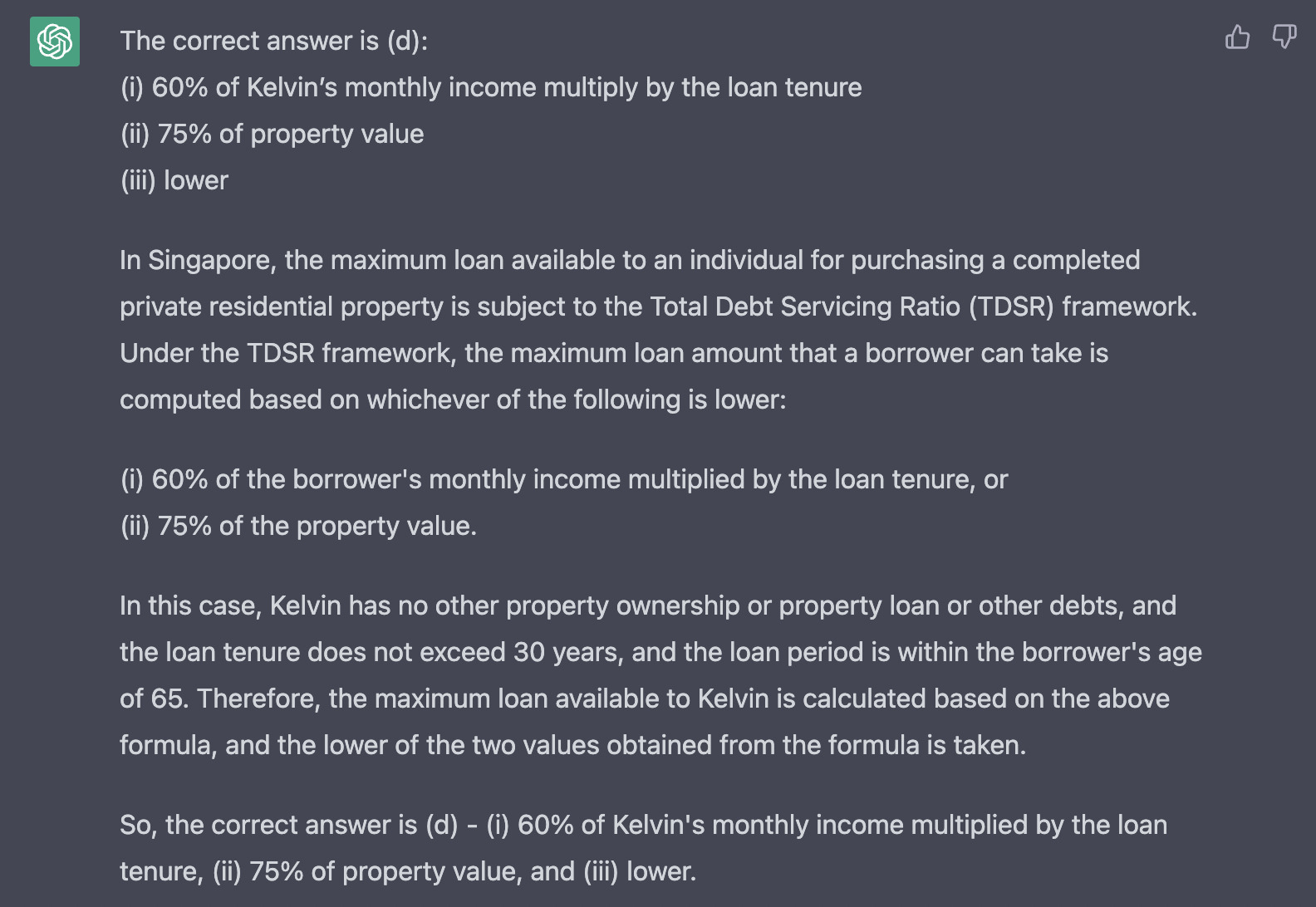
However, with the December 2021 cooling measures, the TDSR has been lowered from 60% to 55%.
(We note that in the original sample questions from CEA, the options were not updated to reflect this. So in our test, we’ve changed the options to reflect the change.)
At the same time, we note that this is due to a limitation of the chatbot.

Since its training data was last updated in September 2021, it would have missed the December 2021 cooling measures announcement.
This also means that for now, it won’t be able to give the correct answer on changes in the sector after September 2021.
But ChatGPT also struggled with property matters and regulations that do not have any changes after the last update of its training data.
Wrong definition of power of attorney
For instance, there’s this question on the ideal arrangement for someone who had a mild stroke recently and wanted to ensure continuity in the management of his properties, should anything bad happen to him.
Options are a combination of these: a lasting power of attorney, power of attorney, owning the property in joint tenancy, and owning the property in tenancy-in-common.
The chatbot’s answer is lasting power of attorney and power of attorney. While it gave the correct definitions of lasting power of attorney, joint tenancy and tenancy-in-common, it did not do so for power of attorney.
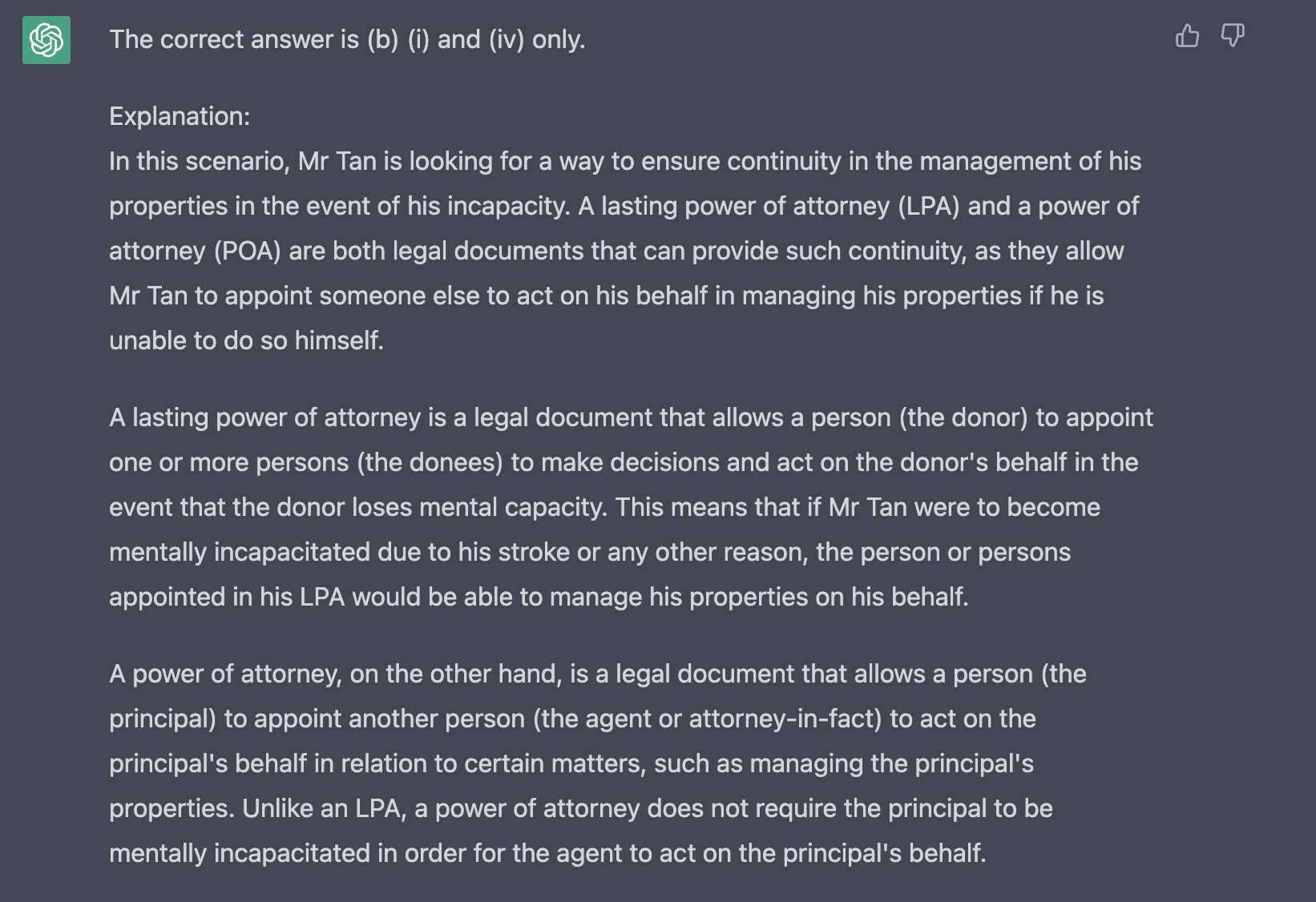
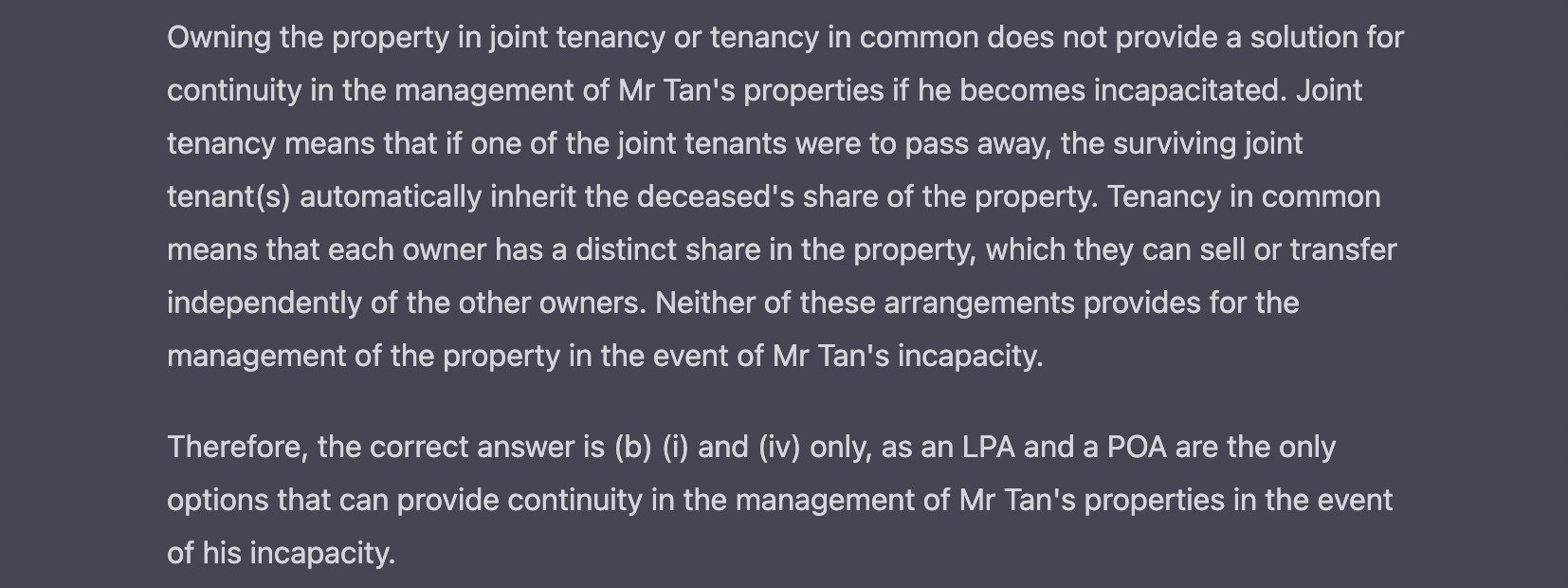
A person with a power of attorney can only sign on behalf of the donor, but not manage their properties.
Confused about the CPF housing grants?
Moreover, ChatGPT got the CPF housing grants mixed-up.
When asked about the maximum CPF grant amount a Singaporean buyer buying a BTO flat for the first time can get, its answer was S$120,000. Which wasn’t even among the four options provided.
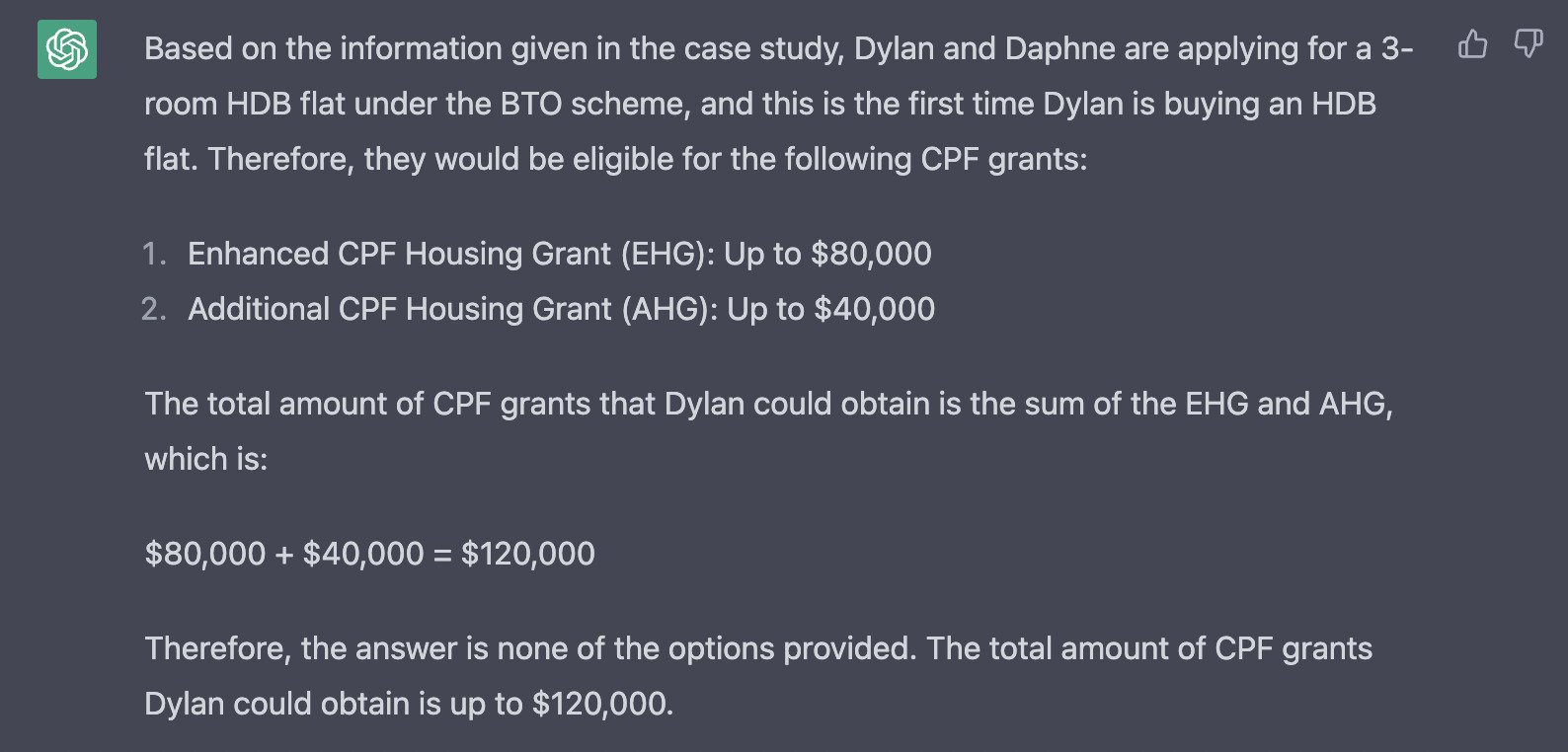
It explained that the person is eligible for the Additional CPF Housing Grant of S$40,000 and Enhanced CPF Housing Grant of S$80,000.
While there were previously Additional CPF Housing Grant and Special CPF Housing Grant, both have since been replaced by Enhanced CPF Housing Grant in September 2019.
(Yes, the CPF housing grants can be confusing, even for some of us when we first started writing about property. But this chatbot should be smart enough to know the change, right? Right?!)
ChatGPT also can’t do math
Perhaps what’s most amusing to us is that the chatbot can’t do simple calculations correctly.
One of the questions we asked is on the property tax payable for someone who owns one owner-occupied house and one rental residential property (aka non-owner occupied property).
Never mind if it doesn’t use the updated tax rates for its calculation.
(Property tax rates have since changed effective 1 January 2023. But since its training data was last updated in September 2021, it used the tax rates previously applicable from 2015 to 2022.)
Never mind if it applied the wrong formula to calculate the tax rate.
(For an owner-occupied residential property with an annual value of S$65,000, it applied a 4% tax rate on the remaining S$57,000 instead of the remaining S$47,000 – which was the previous tax rate.)
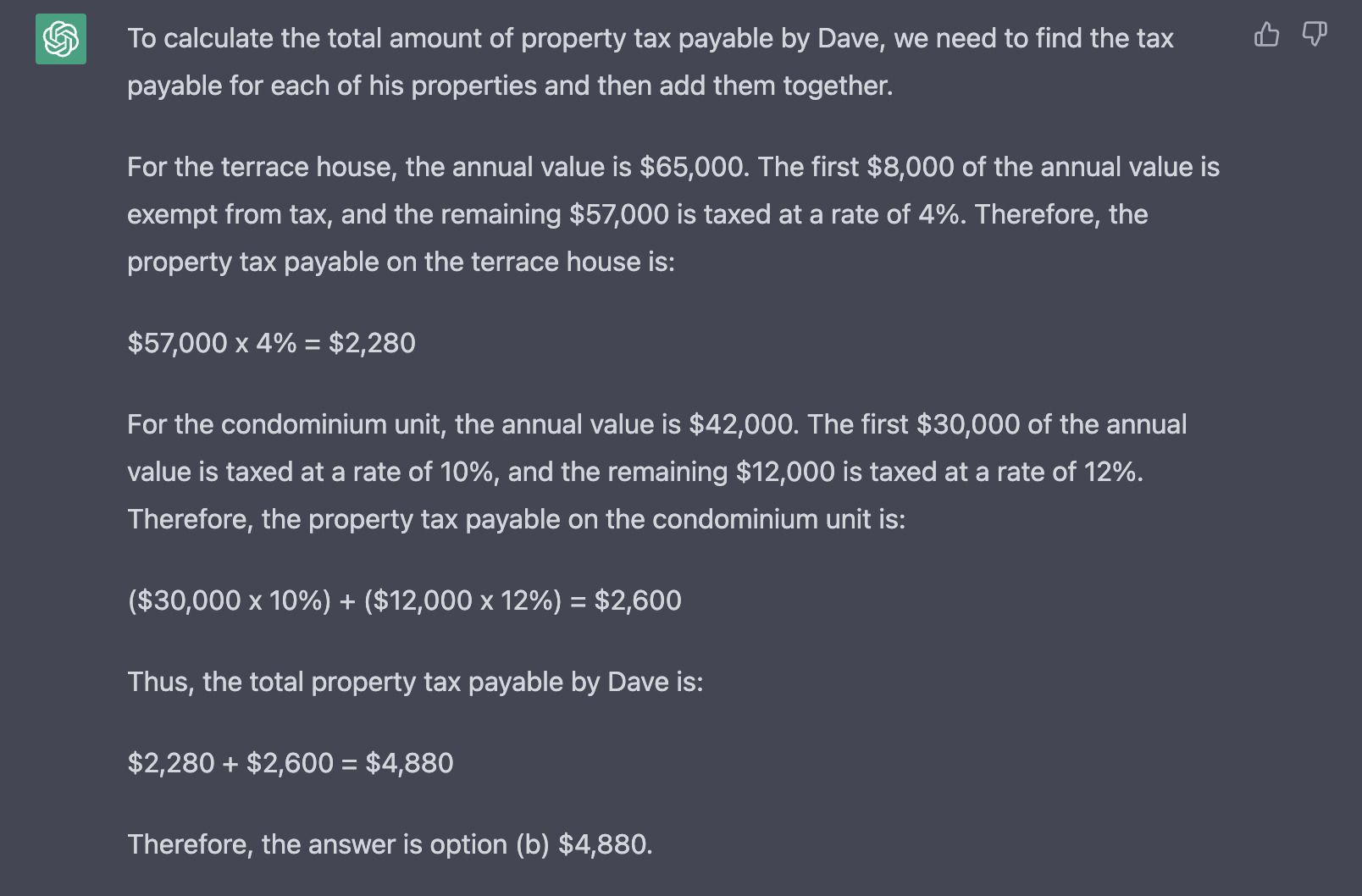
The fact is, it stumbled on doing simple maths. Just like it did for the PSLE maths papers.
To calculate the property tax for non-owner occupied residential property with an annual value of S$42,000, this was their calculation (again, we note that it’s using the tax rate effective 2015):
(S$30,000 x 10%) + (S$12,000 x 12%) = S$2,600
If we use the tax rate effective 2015, the tax payable for the rental property should have been S$4,440!
What ChatGPT got right
Nevertheless, ChatGPT was able to get a few questions right.
There’s one question about easement and the rights on another person’s land, and the chatbot could explain its answer correctly.
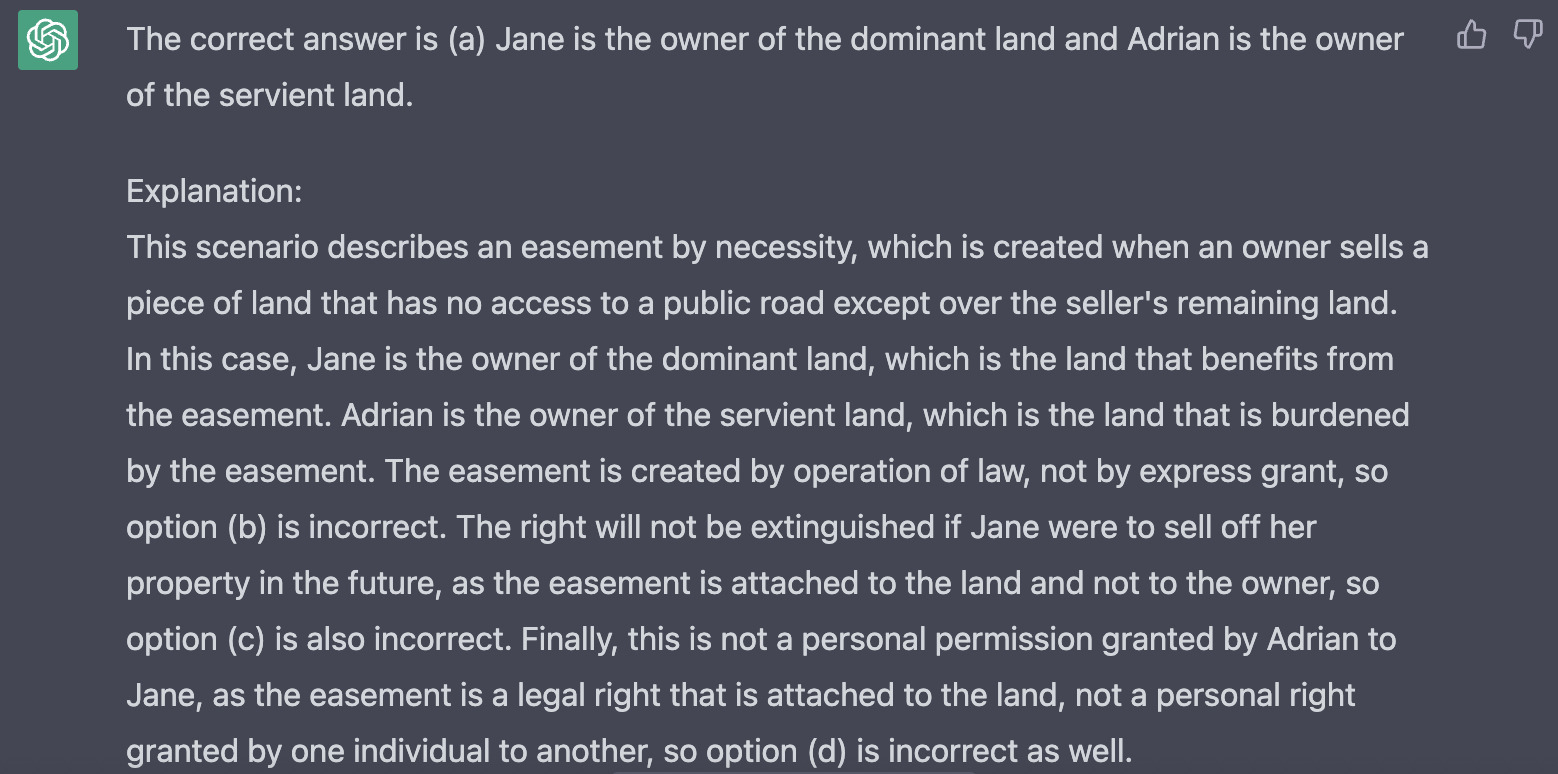
It also got a few things right about a couple of HDB regulations.
For instance, it gave the right priority scheme when prompted on the scheme a couple with a kid can apply for to get their BTO flat earlier.
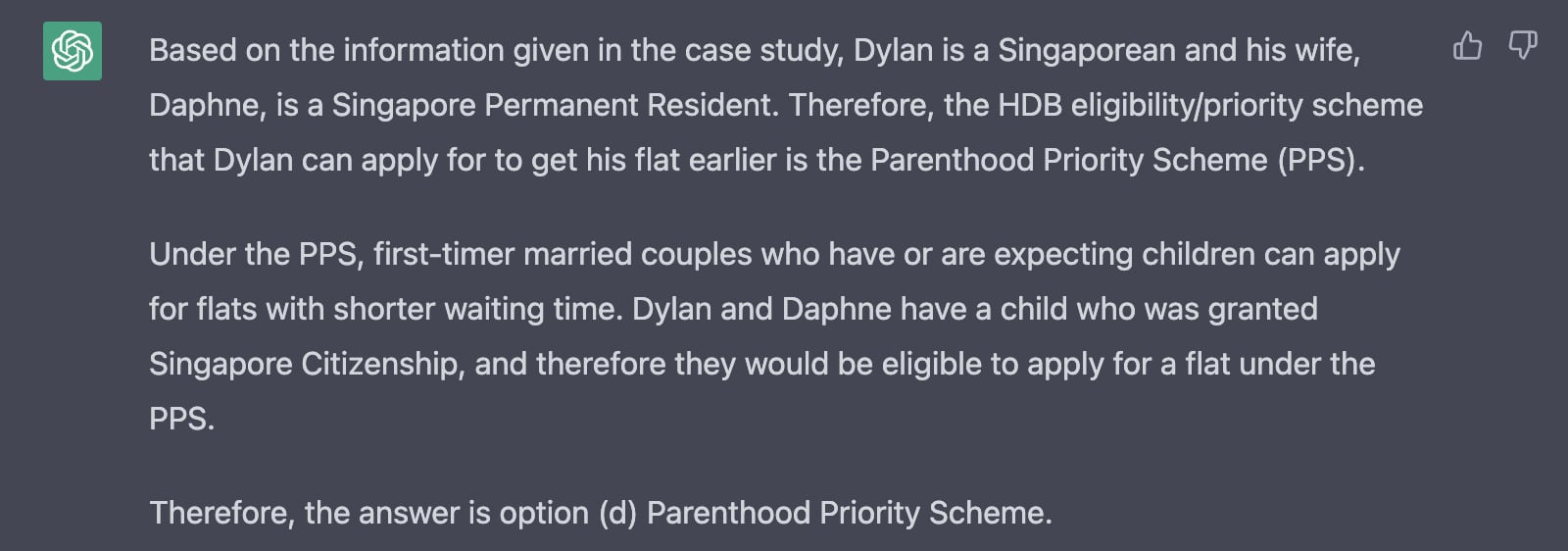
And when asked a question related to renting out an HDB flat, it could explain that the owner will need to apply to HDB for permission beforehand, or risk getting penalised.

What does this mean for the property scene in Singapore?
While we only tested ChatGPT with 10 questions (the actual RES exam comprises two papers, each with 80 questions), its wrong explanations and training data being last updated in September 2021 tells us that for now, the chatbot may not be the best tool when it comes to answering property-related questions.
As we’ve seen from our simple test, there are many inaccuracies in its answers. While you can still ask the chatbot property-related queries, you may want to cross-reference the answers given with other reliable sources.
Alternatively, we recommend you to refer to official sources like HDB’s or IRAS’ websites, or property portals like 99.co. Or you can always ask your property agent.
Properties for sale
Planning to sell your property soon but unsure on where to start? Consider getting a personalised consultation with a premier property agent.
If you found this article helpful, 99.co recommends What hidden costs are there when selling your house? and 5 ways selling your property can go horribly wrong (and how to fix it).
The post Can ChatGPT pass the Real Estate Salesperson (RES) exam? appeared first on .











































































































